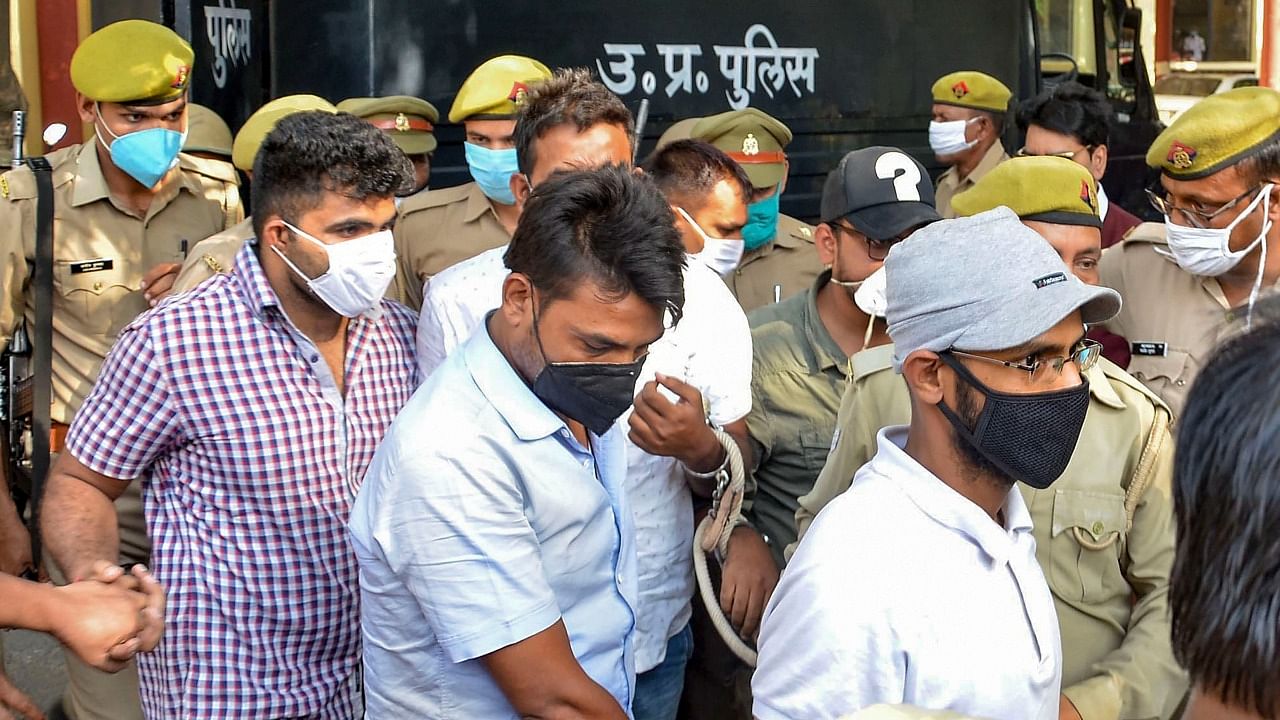
Long chargesheets filled with incredulous claims by investigative agencies to target people the ruling Bharatiya Janata Party (BJP) finds inconvenient have become the order of the day. Such is the proliferation of such chargesheets that they threaten to kill the usual element of surprise when confronted by them. Yet surprise is what overwhelms one reading some of the allegations in the 5000-page chargesheet of the UP Special Task Force (STF) against Delhi-based journalist Siddique Kappan.
On his way to report on the alleged gangrape and murder of a Dalit woman in Hathras, Kappan was arrested by the UP police a year ago. In line with current norms of persecution, the police have charged Kappan with sedition.
In the chargesheet, which includes a case diary note, parts of which have been published by The Indian Express, the investigator accuses Kappan of not functioning like a "responsible" journalist in writing reports "only and only" to "incite Muslims." It has underlined extracts from some 36-odd articles he wrote for a Malayalam media organisation on a range of topics, including the anti-Citizenship Amendment Act (CAA) protests, the violence in Northeast Delhi 2020, the sedition charge against the jailed Sharjeel Imam, and the Nizamuddin Markaz assembly after the outbreak of Covid-19.
Picking on one of the articles written during the anti-CAA protests in Aligarh Muslim University (AMU), the note charges the journalist with portraying Muslims as "victims" who were "beaten up by the police and asked to go to Pakistan." "It is evident from the writing that it has been done to incite Muslims," concludes the note. It further says, "These writings of Siddique Kappan, to a great extent, can be classified as communal. During riots, taking the name of a minority and talking about events related to them can incite sentiments. Responsible journalists do not do such communal reporting. Kappan only and only reports to incite Muslims, which is a hidden agenda of PFI (Popular Front of India). Some stories were written to sympathise with Maoists and Communists."
This is, of course, nothing short of outright intimidation of journalists for what they write. It's a warning to journalists to stick to the straight and narrow, as the BJP sees fit. That independent journalism poses a threat to the ruling dispensation—whether at the Centre or in the states—is an open secret by now. Equally well known is the pliability of investigative agencies and the police force. In fact, the deep corrosion in every institution, and the criminalisation of those in charge of maintaining some semblance of the legal order, has deepened alarmingly in recent years. The compliance and subservience of corporate media, their silence and failure to speak up—firmly and clearly—in support of their own independence have aided and abetted this emerging culture of bullying and arm-twisting.
If reporting on communal tension and violence, the systematic stigmatisation of Muslims, persecution of dissidents, criminalisation of politics is "irresponsible," then the very definition of journalism will have to change. Regrettably, that process is well underway. It is fitting that in these post-truth times, it is not the ones responsible for communalism, persecution, and violence who are held to account, but those reporting on these matters.
The STF note seems to blame Kappan for writing about the anxieties of the Muslim community. This especially at a time they faced, and continue to face, dual spectres in the form of the CAA and the National Register of Citizens (NRC). The truth is, Kappan was only doing what he was supposed to do: his job. Few would dispute that minority communities across the world today have their backs to the wall. Negotiating cruel twists of fate as a minority (caste, colour, religion, gender or any other kind) has never been easy. But in recent years, the assault has become more pronounced and aired in public.
In his new book, The Silent Coup: A History of India's Deep State, investigative journalist Josy Joseph writes about the chequered narrative of the subversion of state-sponsored security agencies. The process of corrupting such agencies—making them do the bidding of the ruling dispensations of the day—was well underway even before the Modi government came to power.
But over the past seven years, that process of corrosion has accelerated and deepened, turning these agencies more than even into instruments weaponised by the party in power. In an interview with Scroll.in, Joseph says, "The cops are not just trigger-happy. That's only one part of the narrative. What we need to understand is that the cops are actually acting out a script that their political masters are writing out." He adds that the chief minister of Uttar Pradesh has been flaunting and celebrating encounters and that a large number of people believe the state has been able to get a grip over the law and order situation: "You believe that until they come for you, and your neighbour. It may look all peaceful, but the fact is that the police is executing a political narrative, which is largely encouraged by their own communal politics and a false sense of bravado."
The cases of Siddique Kappan, and that of more than a dozen jailed political prisoners charged with equally overblown allegations, and of activists held under the excess of the Unlawful Activities Prevention Act (UAPA) for their alleged role in the violence in Northeast Delhi, are bound by a common thread. The outlandish chargesheets routinely filed against "inconvenient" citizens are testimony to the sorry state of institutions ostensibly created to support democratic norms but that now train their sights on those holding democracy to account.
(Monobina Gupta is the author of 'Left Politics in Bengal' and 'Didi: A Political Biography'.)
Disclaimer: The views expressed above are the authors' own. They do not necessarily reflect the views of DH.